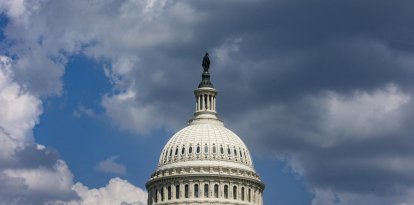Key points approved in the "big, beautiful bill"
After a long night of negotiations, two House committees succeeded in approving key elements of one of the most important pieces of legislation for Republicans.

Speaker Mike Johnson/ Mandel Ngan
Advancing in the House of Representatives is President Trump's "big, beautiful bill" that is central to the Republican agenda and to fulfilling promises made during the presidential campaign. After a long night of debates, this Wednesday, May 14, the Energy and Commerce Committee and the Ways and Means Committee managed to approve key parts of the bill that will have to be voted on by the full House and then must go to the Senate.
Spending Cuts
The Energy and Commerce Committee approved a cut of $880 billion; most of the money will be cut from Medicaid. Among other things, in this area the bill plans to impose penalties for states that use Medicaid funds to cover people who entered illegally. It also requires states to require work requirements for childless adults between the ages of 19 and 64.
During the discussion of these measures, congressmen even had to deal with protesters who stood for hours outside the building where the Energy and Commerce Committee was meeting, claiming that Republicans seek to cut Medicaid funds. Republicans have said that their bill only seeks to reduce waste and abuse of the system so as to allocate a greater proportion of resources to health care for vulnerable populations that really need it.
This morning, House Speaker Mike Johnson directly asked reporters not to distribute what he called Democrat-driven disinformation, saying that Republicans will protect Medicaid for people who deserve it and need it, but the abuse must be eliminated. Johnson has said on different occasions that the program is not set up to fund young people who simply don't want to work but to assist people who truly need it.
Raising the debt ceiling
The House Ways and Means Committee approved raising the national debt limit by $4 trillion to avoid a potential default. Including this item in the "big, beautiful bill" would avoid tortuous negotiations with Democrats to raise the debt ceiling.
In its proposal, the Senate had put forward a $5 trillion increase. Some Republican senators argue that this higher figure would avoid the risk of default until after the next midterm elections. It remains to be seen whether a majority of Republican senators continue to insist on an increase to that figure.
If passed, this item would allow the government's funding needs to be covered at least through mid-2027, or even 2028, depending on economic growth and the deficit.
Increase in the state and local tax (SALT) deduction limit.
The bill proposes to raise the SALT deduction limit from $10,000 to $30,000, a request that had been strongly made by representatives from high state tax states such as California, New York, New Jersey, and Illinois. The SALT (State and Local Taxes) deduction allows taxpayers to deduct payments made in taxes to states from their federal taxes.
The House Committee even approved retroactive application to tax year 2024. This item may be very attractive not only to Republican congressmen in Democratic states but also to moderate Democratic representatives who also want to ease the tax burden on their constituents.
Extension of 2017 tax cuts.
The Ways and Means Committee approved the permanent extension of several components of the 2017 Tax Cuts and Jobs Act (TCJA). Major items include the continuation of lower tax rates for individuals; the raised standard deduction of $15,000 for singles and $30,000 for couples; the $2,000 child tax credit; and the 20% deduction for small business income. Also approved was the elimination of taxes on tips and overtime.

























